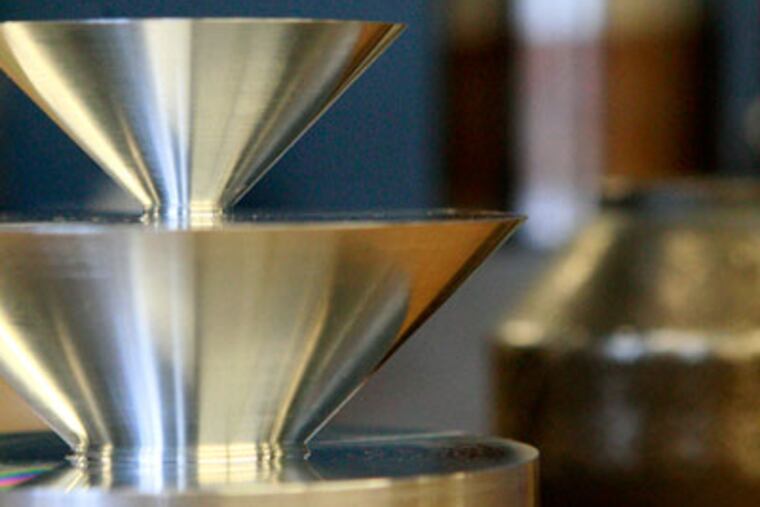Retooling for factories of the future
Small operations can ride a green wave, a manufacturing study says, with the right policies, funding, and training.

From the outside, Windle Mechanical Solutions Inc. is a squat, inconspicuous factory almost as unremarkable as the same-as-the-next rowhouses that surround it in Philadelphia's Tacony section.
Inside, it's no more phenomenal. There are no snaking assembly lines, no massive stockpiles of steel, aluminum, and bronze. But then, there are no big orders.
On last week's jobs list:
* Six positioning devices for probes on an automatic welding machine;
* Four wheels for a military carrier launch and retrieval system;
* Four couplings for a nuclear pump application;
* Two helicopter-frame fittings;
* Two airplane landing-gear parts, and
* Two parts for biopharmaceutical freeze-driers.
It amounted to $50,864 worth of work - and affirmation of a summer's worth of effort by Elliott Gold.
A policy fellow at the Greater Philadelphia Sustainable Business Network, Gold has spent the last three months assessing manufacturing's role in the city's economy.
His conclusion: "Manufacturing isn't dead, and there's a lot of potential."
But in all likelihood, that potential is not for the massive factories of old that employed hundreds, if not thousands, for round-the-clock shifts that turned out product in bulk.
Philadelphia's manufacturing future, Gold said, will be shaped by small, low-volume, and high-margin niche shops like Windle.
Whether that model will truly flourish, however, will depend on a concerted effort by the region's government, economic, labor, and educational leaders. They need to ensure there is an adequately trained workforce and public-private funding to help manufacturing companies to set up here - or, if they are already here, to expand or retrofit to capitalize on the momentum for alternative-energy sources and the equipment needed for them.
Wind turbines, batteries, solar cells, and energy meters have lots of parts.
"If we do this right, if we catch this wave at the forefront," Gold said, "we can really develop it in Philadelphia to build an entire supply chain, to make sure that it is sustainable."
His manufacturing study is intended to stimulate public policy and funding discussions among numerous groups on the topic of reenergizing and growing Philadelphia's manufacturing sector.
"We see this as painting the picture for the next year of work," said Kate Houstoun, green-jobs coordinator at the Sustainable Business Network.
The study is part of the Emerging Industries Project, a new and continuing effort by the Sustainable Business Network and the Green Economy Task Force to explore opportunities for businesses and workers in Philadelphia and develop a comprehensive strategy for growing the city's green economy. A report on Gold's work will be released at a public meeting Oct. 2.
The Inquirer was provided a draft copy. Among its highlights:
* Manufacturing contributed more than $33.6 million in business-privilege taxes to Philadelphia in 2007, the most recent year for which data were available. That was third behind professional services ($90.3 million) and real estate sectors ($55.7 million).
* The city has 28,000 manufacturing jobs.
* The average manufacturing wage here is $49,000.
* Most of the city's 3,200 manufacturers have fewer than 100 employees.
* A lack of interest and attention to the city's manufacturing base has limited the resources devoted to sustaining and growing it.
* The limited capacity of small manufacturers affects their ability to pursue markets, develop products, and gather information on programs that could help them.
* Manufacturers need workers strong in "soft" skills (including punctuality and getting along) and highly specialized skills (such as operating computers and applying math to the production process)
Just the idea that a study has been done wins rave reviews from Steve Jurash, president and chief executive officer of the Manufacturing Alliance of Philadelphia, a trade group.
"We believe that manufacturing is probably the last best chance for this city's neighborhoods in terms of employment," he said last week. "Any time we get attention paid to preserving that sector is a good thing."
Jurash is coming off two disappointments this month, both rejections for funding.
One was for $600,000 in federal stimulus funds through the local Workforce Investment Board for a jobs-training program.
Also turned down was an application for $5.5 million from the Pennsylvania Economic Development Authority for a high-tech generator to recycle heat energy given off by the manufacturing process at the Port Richmond Industrial Development Enterprise (PRIDE), a complex of 53 manufacturing companies in a three-block area north of Center City. Jurash said the project would reduce energy bills, increasing PRIDE's attractiveness to manufacturers looking for a home.
In Tacony, Pete Windle, who left an executive job three years ago to buy his machine shop, expects to do about $1 million in business this year. It will be enough to keep his workforce of eight employed, he said. But his goal is to one day have as many as 50 on the payroll.
"I'm not naive to think it's ever going to be what it was in the heyday," Windle said. "But there's definitely a place for manufacturing."